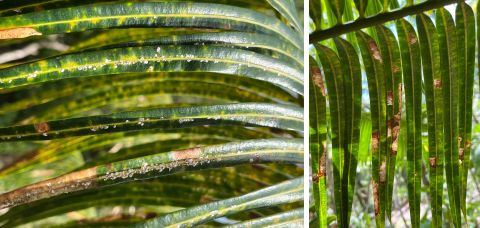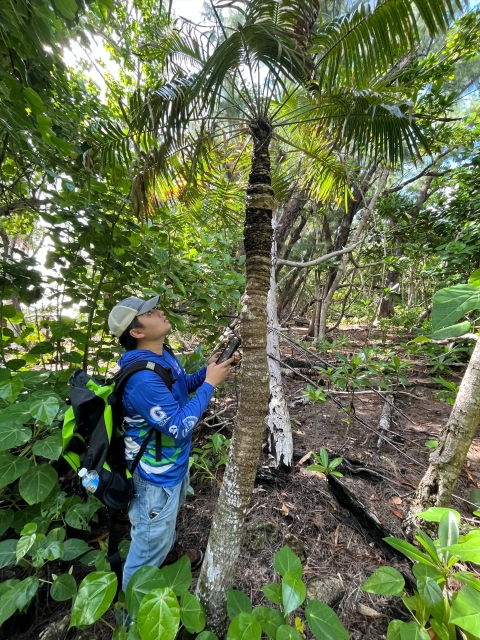Mabuhay and Håfa Adai! My name is Joshua Artuz, and I’m proud to say that I’m the first Kupu member at the Guam National Wildlife Refuge. Currently, I’m a student at the University of Guam, pursuing a Bachelor of Science degree in Tropical Agriculture Production with a minor in Farm and Natural Resource Management.
I am currently a Kupu member in a one-year program focused on the Cycas micronesica project. The fadang (Cycas micronesica) was once an abundant native tree in Guam’s forests and remains a culturally significant species to the people of Guam. However, due to the introduction of the cycad aulacaspis scale (CAS) in 2007, the once plentiful fadang population has declined and become federally-listed as a threatened species. Today, the fadang population faces many threats, including the non-native cycad blue butterfly (Chilades pandava), non-native cycad leafminer (Erechthias sp.), a native stem borer (Dihammus marianarum), ungulates (such as wild pigs), typhoons, and especially cycad scale (CAS), which significantly impacts the tree's health.
This internship is an essential part of a broader research initiative to identify natural predators of CAS and to study changes over time in fadang, CAS, and their predators across Guam and Rota. I will conduct fadang health assessment surveys and CAS monitoring for this project. Specifically, I will tag and measure 2,000 Fadang trees, document CAS infestation levels, and monitor fadang juvenile and seedling growth. The systematic data collection on CAS infestation and predator populations will aid in developing effective conservation strategies to protect this species from further decline, thereby supporting the ecological balance of Guam's forests.
This work is vital to the recovery of Guam’s fadang population. The project results will contribute data that will inform U.S. Fish and Wildlife Service management actions at the Guam National Wildlife Refuge. The findings from this research will also be shared with a collaborative working group across the region to save fadang populations. I am truly happy to continue working at the Guam National Wildlife Refuge with the U.S. Fish and Wildlife Service through the Kupu Conservation Leadership Development Program.
If you're interested in similar experiences, you can apply now for full-time positions with the Kupu Conservation Leadership Program at the Guam National Wildlife Refuge. Applicants must be between the ages of 18 to 29. Full-time year-long positions are available in Visitor Services (Community Outreach & Education) and Invasive Species.



